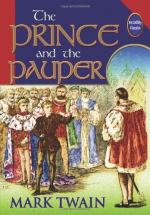Note 10, Chapter XVII. Enslaving.
So young a King and so ignorant a peasant were likely to make mistakes; and this is an instance in point. This peasant was suffering from this law by anticipation; the King was venting his indignation against a law which was not yet in existence; for this hideous statute was to have birth in this little King’s own reign. However, we know, from the humanity of his character, that it could never have been suggested by him.
Notes to Chapter XXIII. Death for Trifling Larcenies.
When Connecticut and New Haven were framing their first codes, larceny above the value of twelve pence was a capital crime in England—as it had been since the time of Henry I.—Dr. J. Hammond Trumbull’s Blue Laws, True and False, p. 17.
The curious old book called The English Rogue makes the limit thirteen pence ha’penny: death being the portion of any who steal a thing ’above the value of thirteen pence ha’penny.’
Notes to Chapter XXVII.
From many descriptions of larceny the law expressly took away the benefit of clergy: to steal a horse, or a hawk, or woollen cloth from the weaver, was a hanging matter. So it was to kill a deer from the King’s forest, or to export sheep from the kingdom.—Dr. J. Hammond Trumbull’s Blue Laws, True and False, p.13.
William Prynne, a learned barrister, was sentenced (long after Edward VI.’s time) to lose both his ears in the pillory, to degradation from the bar, a fine of 3,000 pounds, and imprisonment for life. Three years afterwards he gave new offence to Laud by publishing a pamphlet against the hierarchy. He was again prosecuted, and was sentenced to lose what remained of his ears, to pay a fine of 5,000 pounds, to be branded on both his cheeks with the letters S. L. (for Seditious Libeller), and to remain in prison for life. The severity of this sentence was equalled by the savage rigour of its execution.—Ibid. p. 12.
Notes to Chapter XXXIII.
Christ’s Hospital, or Bluecoat School, ’the noblest institution in the world.’
The ground on which the Priory of the Grey Friars stood was conferred by Henry VIII. on the Corporation of London (who caused the institution there of a home for poor boys and girls). Subsequently, Edward VI. caused the old Priory to be properly repaired, and founded within it that noble establishment called the Bluecoat School, or Christ’s Hospital, for the education and maintenance of orphans and the children of indigent persons . . . Edward would not let him (Bishop Ridley) depart till the letter was written (to the Lord Mayor), and then charged him to deliver it himself, and signify his special request and commandment that no time might be lost in proposing what was convenient, and apprising him of the proceedings. The work was zealously undertaken,




